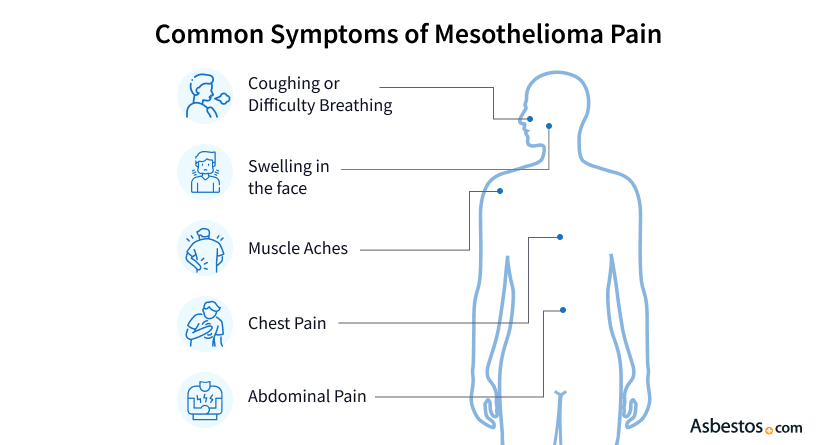Based on Your Reading:
Get Your Free Mesothelioma Guide

Find a Top Mesothelioma Doctor

Access Help Paying for Treatment

Pain is a symptom of mesothelioma. The pain is often dull and distributed throughout the chest or abdomen. Bone and muscle pain can be caused by advanced or metastatic mesothelioma. Tumors and fluid buildup may cause mesothelioma chest or abdominal pain as pressure is put on vital organs.
Written by Karen Selby, RN • Edited By Walter Pacheco • Medically Reviewed By Dr. Jeffrey Velotta
The Mesothelioma Center at Asbestos.com has provided patients and their loved ones the most updated and reliable information on mesothelioma and asbestos exposure since 2006.
Our team of Patient Advocates includes a medical doctor, a registered nurse, health services administrators, veterans, VA-accredited Claims Agents, an oncology patient navigator and hospice care expert. Their combined expertise means we help any mesothelioma patient or loved one through every step of their cancer journey.
More than 30 contributors, including mesothelioma doctors, survivors, health care professionals and other experts, have peer-reviewed our website and written unique research-driven articles to ensure you get the highest-quality medical and health information.
My family has only the highest compliment for the assistance and support that we received from The Mesothelioma Center. This is a staff of compassionate and knowledgeable individuals who respect what your family is experiencing and who go the extra mile to make an unfortunate diagnosis less stressful. Information and assistance were provided by The Mesothelioma Center at no cost to our family.LashawnMesothelioma patient’s daughter


Selby, K. (2024, February 2). Mesothelioma Pain. Asbestos.com. Retrieved April 24, 2024, from https://www.asbestos.com/mesothelioma/symptoms/chest-abdominal-pain/
Selby, Karen. "Mesothelioma Pain." Asbestos.com, 2 Feb 2024, https://www.asbestos.com/mesothelioma/symptoms/chest-abdominal-pain/.
Selby, Karen. "Mesothelioma Pain." Asbestos.com. Last modified February 2, 2024. https://www.asbestos.com/mesothelioma/symptoms/chest-abdominal-pain/.
Mesothelioma tumors cause pain as they grow and push against sensitive nerves or vital organs. As mesothelioma cancer progresses, fluid buildup can lead to pain with activity, breathing, coughing and eating.
Advanced or metastatic mesothelioma can cause bone or muscle pain as tumors spread throughout the body. Mesothelioma back pain, joint stiffness and body aches become more likely. Doctors can ease these symptoms through palliative surgery or radiation therapy. If left untreated, severe or chronic pain leads to feelings of anxiety and depression.
More than 60% of pleural mesothelioma patients report chest pain. Between 30% and 50% of peritoneal patients have abdominal pain. Mesothelioma pain can be more challenging to treat than pain from other types of cancer. Report all your mesothelioma symptoms to your doctor. It will help them prescribe the right treatments.
Specific mesothelioma treatments may also be a source of pain for some patients. Chemotherapy medications, radiation treatments and surgeries can damage healthy tissue and create discomfort.
While mesothelioma pain is a symptom of cancer, there are other symptoms of mesothelioma caused by the cancer. Depression and changes in sleep and appetite can disrupt or impair quality of life.

Pain can create significant disruptions in daily life. But many treatment approaches for mesothelioma pain can ease your symptoms and improve energy and mood.
Pain medication works for most cancer patients but not for everyone. Options such as palliative surgery or procedures can reduce pain without drugs. For example, fluid buildup in the chest or abdomen may cause pain. An outpatient procedure or minor surgery to drain the fluid can reduce pressure and pain.
Pain symptoms may also show issues with ongoing treatment. Abdominal pain led to the diagnosis of adrenal insufficiency in a mesothelioma patient. The pain was a side effect of nivolumab treatment, a 2021 report showed. Talking to your doctor about pain management is integral to every mesothelioma treatment plan.
Some patients worry that taking prescription opioids will lead to addiction or over-sedation. Pain relief from opioids often allows patients to resume their normal daily activities. Often, a cancer patient’s quality of life is better with opioids than without them. You can review the risks and benefits of opioid treatment with your healthcare provider.
Every mesothelioma cancer patient experiences pain in unique ways. There are many treatment options and delivery methods. A pain patch or oral pain medication help patients to cope with mesothelioma pain. Ask for a referral to a pain management clinic if you feel overwhelmed by your pain.
Get Your Free Mesothelioma Guide

Find a Top Mesothelioma Doctor

Access Help Paying for Treatment

An essential part of pain management is communication. Keep your doctors informed of your pain medications’ effectiveness and side effects. A daily journal is a helpful tool for recording what you’ve tried and describing what’s working and what isn’t.
Ask a pharmacists if you have questions about the safety of a pain management approach.
Mesothelioma back pain, body aches and abdominal issues disrupt life in many ways. These symptoms can cause problems such as insomnia, stress, fatigue and feelings of anxiety and depression. Discuss these issues with a doctor to limit pain before it becomes overwhelming.
Your web browser is no longer supported by Microsoft. Update your browser for more security, speed and compatibility.
If you are looking for mesothelioma support, please contact our Patient Advocates at (855) 404-4592
